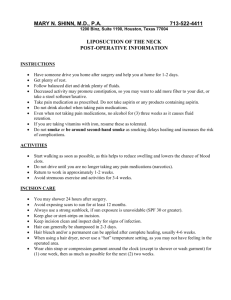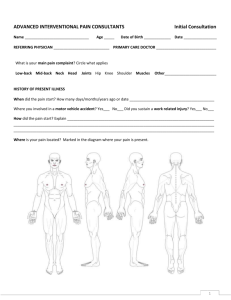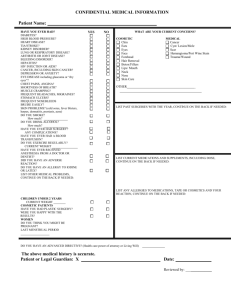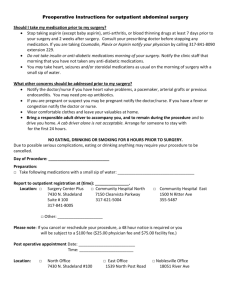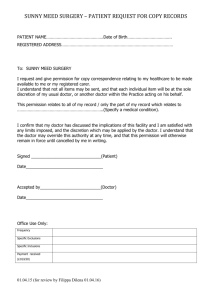Thoracotomy: Preparing for Surgery During thoracotomy, your
advertisement
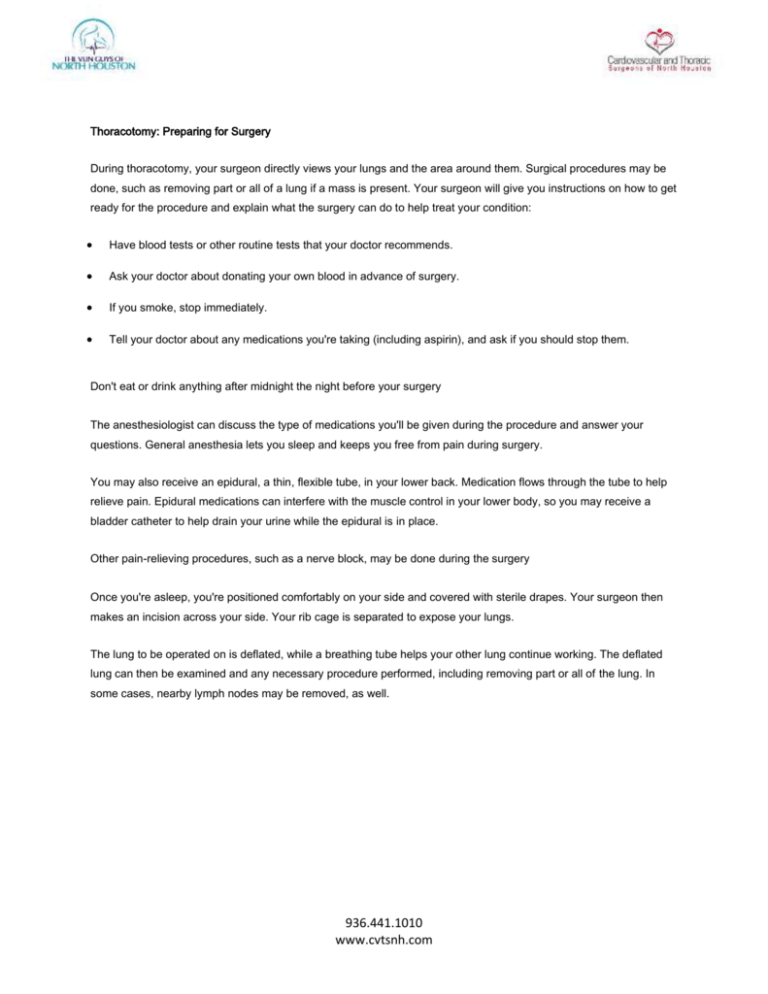
Thoracotomy: Preparing for Surgery During thoracotomy, your surgeon directly views your lungs and the area around them. Surgical procedures may be done, such as removing part or all of a lung if a mass is present. Your surgeon will give you instructions on how to get ready for the procedure and explain what the surgery can do to help treat your condition: Have blood tests or other routine tests that your doctor recommends. Ask your doctor about donating your own blood in advance of surgery. If you smoke, stop immediately. Tell your doctor about any medications you're taking (including aspirin), and ask if you should stop them. Don't eat or drink anything after midnight the night before your surgery The anesthesiologist can discuss the type of medications you'll be given during the procedure and answer your questions. General anesthesia lets you sleep and keeps you free from pain during surgery. You may also receive an epidural, a thin, flexible tube, in your lower back. Medication flows through the tube to help relieve pain. Epidural medications can interfere with the muscle control in your lower body, so you may receive a bladder catheter to help drain your urine while the epidural is in place. Other pain-relieving procedures, such as a nerve block, may be done during the surgery Once you're asleep, you're positioned comfortably on your side and covered with sterile drapes. Your surgeon then makes an incision across your side. Your rib cage is separated to expose your lungs. The lung to be operated on is deflated, while a breathing tube helps your other lung continue working. The deflated lung can then be examined and any necessary procedure performed, including removing part or all of the lung. In some cases, nearby lymph nodes may be removed, as well. 936.441.1010 www.cvtsnh.com Types of Thoracotomy Procedures When the procedure is finished, one or more tubes are placed in the chest temporarily to drain fluid and air. Then the rib cage is repaired and the muscle and skin are closed with sutures or staples. Recovering at Home After A Thoracotomy Before you leave the hospital, your doctor will review the results of your surgery with you and tell you what to expect during your recovery. You and your doctor can discuss any further treatment you may need for your condition, review the next stage of your treatment plan, and schedule follow-up visits. When you're ready to leave the hospital, have someone available to drive you home. Your Home Recovery For the first several weeks after your surgery, you'll be gaining a little more energy and strength each day. Breathing may be uncomfortable at first, and you may be short of breath. Take things slowly, and rest when you get tired. Your doctor or nurse can talk to you about what you can and can't do as you recover. 936.441.1010 www.cvtsnh.com Caring for Your Incision When you shower, wash your incision gently with warm (not hot) water and mild soap. Bruising, itchiness, soreness, and numbness at your incision site are normal for several weeks after surgery. Taking Medications Take your pain medications regularly as your doctor instructs--don't wait until the pain gets bad before you take them. In addition to medication for pain, your doctor may prescribe other medications. In some cases, this may include oxygen. Easing into Activity For 6 to 8 weeks after your surgery, avoid any activity that might put stress on your healing incisions, such as heavy lifting or yardwork. Do start walking, though, to improve your circulation, lung capacity, and strength. Taking pain medications before activity will help make breathing more comfortable. You'll probably feel short of breath for several weeks. This is normal and will improve with time. As you begin to feel better, you can gradually add more strenuous activities. Ask your doctor how long to wait before returning to sexual relations, driving, and work. When to Call Your Doctor Call your doctor if you have any of these symptoms: Draining or very red incision Sudden, severe shortness of breath Sudden, sharp chest pain Fever over 101°F Rapid heartbeat or “fluttering” in your chest 936.441.1010 www.cvtsnh.com

